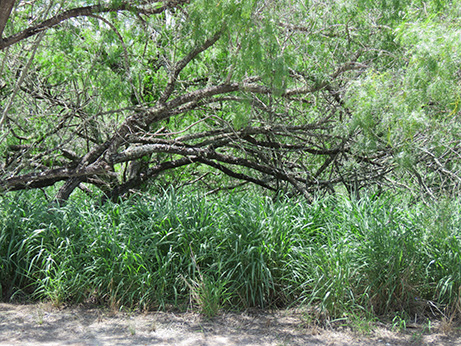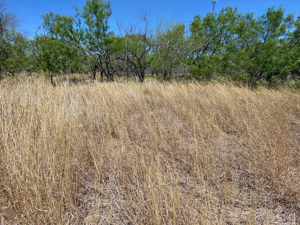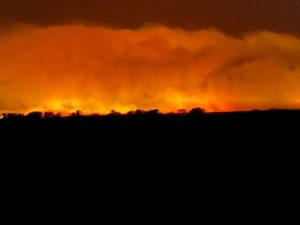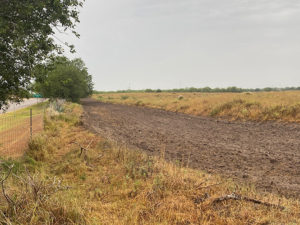By Rick Machen, PhD
Here in the extreme southern end of the Great Plains, annual rainfall typically follows a bimodal pattern; April, May, and June are the spring ‘wet season, while August, September, and October host the late summer/early fall rains. The bulk of the forage cows depend on is warm season perennial grasses, so the spring rains are essential for initiating forage growth.
South Texas enjoyed timely rainfall this spring and some areas grew an abundance of grass; more than sustainably-stocked cattle could keep up with. The example below is several thousand pounds of guinea grass (Megathyrsus maximus) per acre under a mesquite canopy.

Along come the dog days of summer, high daily temperatures, relatively low humidity, wind, and a fine fuel load that is primed for ignition – the perfect recipe for range fires.
Accumulation of large (now dry) fuel loads under a tree canopy has the potential to elevate a grass fire into the tree canopy, resulting in a crown fire that has appreciably different character than a grass fire on the ground.
- Accumulation of large (now dry) fuel loads under a tree canopy has the potential to elevate a grass fire into the tree canopy.
- Resulting crown fire that has appreciably different character than a grass fire on the ground.
- A common practice to mitigate wildfire risk is to create bare mineral soil fire guards just inside perimeter fences.
Smokey Bear’s prevention of wildfires message rings loud and clear. Ranches exercise a variety of options to minimize the risk of wildfire.
A common practice is to create bare mineral soil fire guards just inside perimeter fences. Well-traveled pasture roads on the perimeter can serve a similar purpose.
Another management practice is to mow or graze susceptible areas short to minimize the fuel load. Encroaching wildfires travel with the wind, so devoting attention to the prevailing summer wind direction and reducing the fuel load immediately susceptible to an approaching fire can stop or impede an approaching fire.
Maintain firebreak buffers around homes, buildings, and livestock handling facilities.
Before the range ignites, get to know your local fire department and first responders. Familiarize them with the ranch (entry points, water sources, residences, buildings and infrastructure) and fire-fighting capabilities (personnel and equipment).
When smoke is on the wind, it’s too late to prepare.



